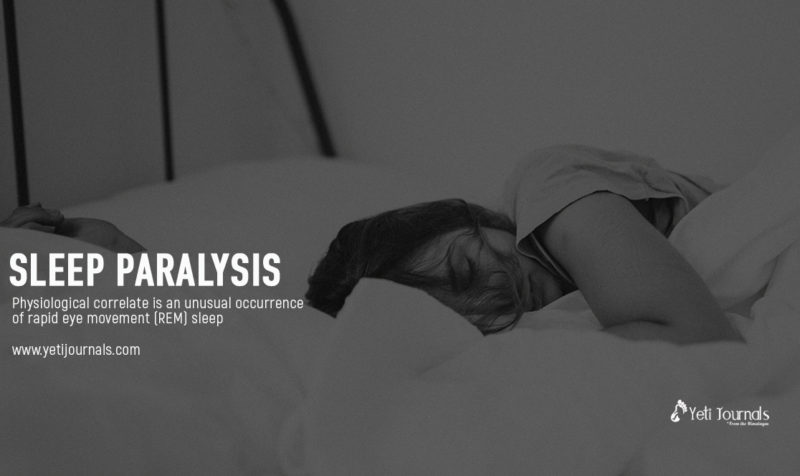You’re deeply relaxed. All of a sudden, you feel something or rather someone attacking you. You try to retaliate them with all your might. Yet, you fail. The figure doesn’t go away. You try to run, but it seems like your feet cannot move. You try to scream, but it seems like you’ve lost your voice. The figure gets near; you are scared shitless, yet there’s nothing you can do. Then miraculously, your eyes open and the figure/s are no longer there. But that doesn’t let your fear go away. It lingers.
Have you ever been in a situation as such? If not, consider yourself lucky. Because, no matter how many times you go through it, the experience is always scary. It’s, even more, scarier when you do not know what’s going on. The scariest would be when you go talk about it to someone who is a bit conservative and they tell you that it might be some kind of devil putting pressure on your body.
The phenomenon that is being talked about is “Sleep Paralysis”. To put it simply, it is a condition when a person is locked in a weird state between waking and dreaming. It is the temporary inability to move or speak that occurs when you are waking up or falling asleep. Basically, the brain awakens while the body stays paralyzed. So, you are alert and conscious but are unable to move the voluntary muscles.
Sleep paralysis has been differentiated into three categories based on the experiences encountered by different people. The first is the feeling of some kind of intruder in the room. In this, one may hear sounds of doorknobs opening, shuffling footsteps, a shadow man, or sense of a threatening presence in the room. The second one is called an incubus. In this, a person feels pressure on the chest, finds difficulty in breathing with the sense of being assaulted by a malevolent being. The person might even believe they are about to die. The third one is called vestibular-motor condition. In this, the person gets a sense of spinning, falling, flying, or another type of out-of-body movement.
Surveys provide that almost 40 percent of people have experienced sleep paralysis in their life. However, the pathophysiology of sleep paralysis has not been concretely identified, although there are several theories about its cause. The first of these stems from the understanding that sleep paralysis is a parasomnia resulting from dysfunctional overlap of the REM (rapid eye movement) and waking stages of sleep.
Several factors can, however, trigger such condition. One of the major factors being sleep deprivation. With everyone having a busy lifestyle with an even busy nightlife, it isn’t surprising that almost half of the world is getting less sleep than they need. 18 percent of the people are even termed insomniac. So, along with numerous health hazards, sleep deprivation has been a principal factor causing sleep paralysis.
Similarly, a changing sleep schedule, sleeping on your back, the use of certain medications, stress, and other sleep-related problems, such as narcolepsy, may also play a role. Research has also found a genetic component in sleep paralysis meaning that it might have a heritable component. However, profound studies on the matter haven’t been conducted yet.
A few episodes of sleep paralysis are said to be a normal occurrence. So, it’s treatment isn’t necessary. But, it is a frightening experience and one could even vow to never want to experience that. For that, getting plenty of sleep is one crucial way to reduce sleep paralysis. Similarly, managing stress, reducing the intake of stimulants, practicing meditation, or regular prayer might help prevent it.
There’s no particular definition nor a particular cure. So, one must find their way to cope up with what they face psychologically, in this case, sleep paralysis.
What I do is that I try to remain aware even during my dream. As in, I try thinking that no, this is just a dream, I am in control of what I dream. So, I start searching for something or even someone to defend myself. Now, this might even sound absurd and almost impossible but that’s something I was told by my cousin and I have been trying that technique. And honestly, it works for me.
Though, if the problem persists and you find yourself fearing to go to sleep or you have heightened anxiety, it is best advised to get some medical attention.
Sleep is a safe haven for most of us. Be it to get some rest or relax or not think about any problems, we resort to sleeping. Facing difficulties in such a cherished activity is hence, a great problem. So yeah, let’s find ways to cope and develop healthy sleeping habits.
So, which category do you belong to, sleep is for the weak or sleep for the week?

Just trying to understand life one step at a time and sharing what I think, believe, feel, and see. So, decipher life through my eyes the 5 minutes you read what I write.

